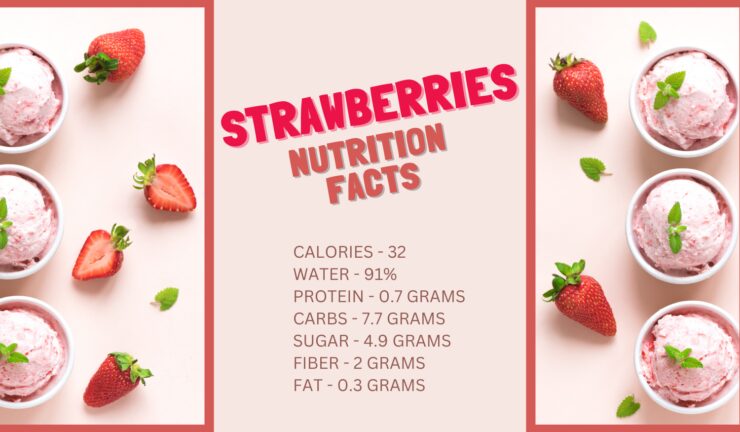Strawberries are a highly popular fruit that can be added to numerous delicious dishes, salads, and cakes. However delicious and healthy as they are, many people ask themselves a question – are strawberries acidic? Today we will talk on this subject and provide much-needed answers to this question.
People generally know that strawberries are rich in vitamin C and that they are a healthy fruit to eat, but few know that they are actually acidic. When consumed moderately, they pose no danger, but excessive consumption may lead to issues for people with heartburn and increased sensitivity to acidic foods. In this article, we will take a closer look at strawberries’ acidity and break down how they affect your health. We have a lot of ground to cover, so let us get into it.
Contents
Are Strawberries Acidic and How Do They Affect Your Health?
Yes, strawberries are acidic fruit. However, the acidity of strawberries is pretty mild when compared to other fruits, such as lemons and oranges. Their pH level stands at 3.0, which means they are only slightly acidic. Although acidity levels in strawberries are pretty mild, it is still crucial to know that they may affect your health, especially if you have heartburn issues or sensitivity to this type of food.
Acidic food can also affect oral health since acid can cause tooth enamel to break down, which is a process called demineralization. This process weakens your teeth and makes them more susceptible to cavities. In addition, this acid can irritate your gums and cause them to bleed if consumed excessively.
Although these are extreme consequences of excessive consumption of strawberries, it is important to know what effect they might have on your overall health and well-being.
What Type of Acids Do Strawberries Contain?
Strawberries contain citric acid, malic acid, and quinic acid. The citric type is the most sizeable, followed by malic acid, while the quinic type is present in smaller amounts, and all three contribute to the tartness of strawberries.
Although most people believe acids are harmful substances, they are important for many biochemical reactions in the body. For example, they are highly important for maintaining a proper balance of fluids in the body, and they aid in the digestion of food.
It is important to note that acids in strawberries are not likely to cause any harm, but eating excessive amounts can lead to various stomach issues and diarrhea. This is due to the fact that strawberries have high amounts of natural sugars, which can ferment in the gut and lead to gastrointestinal distress. Therefore, it is recommended to consume them in moderate amounts.
Can I Somehow Make Strawberries Less Acidic?
In case you have acid reflux issues but still cannot resist some strawberries in your diet, you will be glad to hear there are ways you can make them less acidic. You can pair strawberries with some alkaline foods that will neutralize acidity.
For example, if you are making a smoothie with strawberries, you can mix it with some unsweetened almond milk. This milk is alkaline-forming when in your body, and mixed with strawberries can prevent acid reflux reactions and allow you to still enjoy this delicious fruit.
Are Strawberries Good for Your Health?
Medical and nutrition experts commonly advise people to eat as many fruits and vegetables as they can, and it is not any different with strawberries, which are rich in important nutrients and vitamins. So, yes, strawberries are very good for your health when consumed moderately.
They are an excellent snack for anyone that does not have an allergy to them, of course. Strawberries are a very low-calorie food, with only 54 per cup. This means you can eat quite a bit without feeling like you are eating something that can be hard on your stomach.
For people that train often and have specific fitness goals in their minds, strawberries are a fantastic addition to their diets. Combined with a few calories per serving, they also have less than a gram of fat and no added sugar, which is a piece of great news for all fitness enthusiasts that enjoy this delicious fruit.
They are also rich in vitamin C, iron, vitamin B-6, calcium, and magnesium, all of which are essential in nutrition. Moreover, they have plenty of antioxidants, which makes them highly beneficial for your heart health, and blood sugar level management.
Will I Get Heartburn if I Eat Strawberries?
Sadly, yes. Strawberries are known to cause acid reflux and heartburn, especially in people that are sensitive to acidic foods. However, if you consume them moderately and eat one or two strawberries here and there, you likely will not experience any issues.
It is important to keep in mind that everyone is different, and reactions to acidity are not always the same for everyone. The best course of action would be to consult your medical healthcare provider before indulging in a meal with strawberries.
Are Frozen Strawberries Causing Acid Reflux?
Even though fresh strawberries are considered to be the most acidic, they keep their acidity levels pretty much the same regardless of their state, so yes, even frozen strawberries can contribute to acid reflux.
However, strawberries can have different uses, even if they do cause acid reflux. For example, you can mix them with cream, milk, or yogurt, and these products can serve as a coat for the stomach to prevent the side effect of the acid. You can also toss some strawberries in a blender alongside a banana, soy, or almond milk, and you will get a similar effect.
Strawberries Nutrition Facts
Strawberries mainly consist of water and carbohydrates, that stand at 91 and 7.7 percent, respectively. They also possess only smaller amounts of fat (0.3 percent) and protein (0.7 percent. Here is a list of nutrients in 100 grams of raw strawberries serving.
- Calories – 32
- Water – 91%
- Protein – 0.7 grams
- Carbs – 7.7 grams
- Sugar – 4.9 grams
- Fiber – 2 grams
- Fat – 0.3 grams
Bottom Line
Although strawberries are low in calories, delicious, and healthy, they can still cause acid reflux and heartburn, which is why you should consume them in moderate amounts or avoid them altogether, especially if you are sensitive to acidic foods.
However, if you cannot resist them in your diet, there are certain ways you can make their impact lesser. The safest course of action is to visit your doctor and nutritionist before implementing them in your diet, as it is the most secure way to find out whether or not you can consume them.

Steve is a certified trainer with more than 10 years of training experience and he holds a Master’s in Sports Science. Prior to Boston Rock Gym, Steve worked for two years as a personal trainer.





